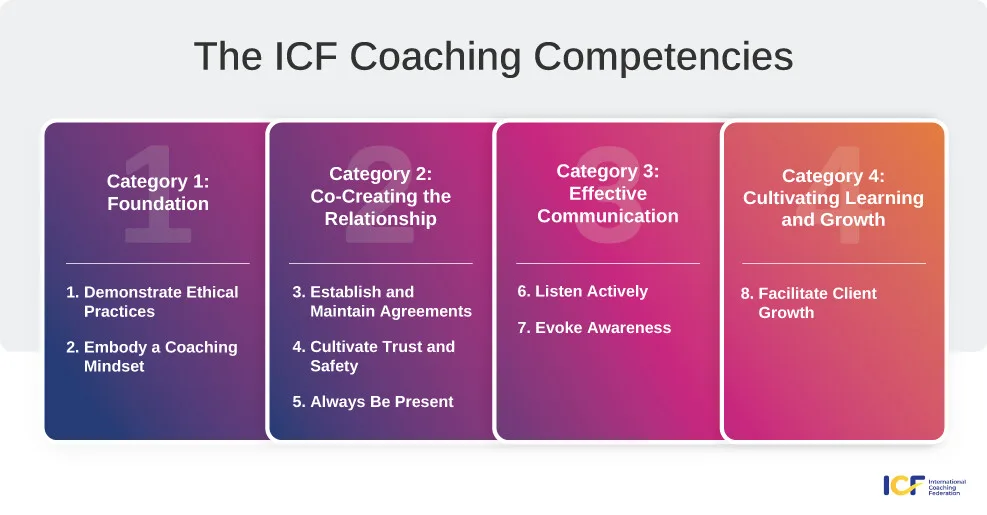Becoming a professional coach requires more than just passion and enthusiasm. It can be a very rewarding and meaningful career — as long as it’s based on proven coaching principles and a deep understanding of core competencies. The International Coach Federation has established a set of ICF coaching competencies that provide a global benchmark for excellence among coaching professionals.
As an ICF-accredited coach education organization, Co-Active Training Institute understands exactly what it takes to be a successful coach — one who helps their clients achieve more than they thought possible. In this article, we provide you with an overview of ICF’s core competencies, including insights and tips to help you excel as an aspiring coach.
What Are the ICF Coaching Competencies?
The International Coaching Federation’s coaching competencies outline the fundamental ICF coaching skills and qualities that every professional coach should possess. These abilities are based on extensive research and decades of actual application and observation, representing the best practices in the coaching industry.
The ICF Core Competencies
ICF professional coaching core competencies are the essential skills and qualities that every professional coach needs to master. They are the building blocks of a successful coaching practice, guiding your interactions with clients and ensuring ethical and effective coaching. We explain each one in detail below.
The Importance of ICF Core Competencies
The International Coach Federation is the world’s leading organization for coaches. They play a central role in setting and upholding professional standards within the coaching industry. The ICF coaching competencies ensure that coaches worldwide adhere to a common set of ethical and practical standards.
Impact of ICF Standards on the Coaching Industry
The official ICF coaching competencies have impacted the coaching industry by:
- Elevating the profession and establishing a clear set of standards that define professional coaching excellence.
- Building trust and credibility to assure clients that they are working with qualified and ethical professionals.
- Driving continuous improvement and encouraging coaches to continuously develop their skills and enhance their practice.
Requirement of ICF Coaching Certification or Accredited Programs
The ICF requires coaches to demonstrate proficiency in all eight core competencies to achieve ICF credentials (such as ACC, PCC, or MCC). These competencies are a key focus in many ICF-accredited coaching curricula, including the Co-Active Coach Training Program.
Learn More About Co-Active’s ICF-Accredited Programs
A Detailed Overview of the 8 ICF Core Competencies
The eight ICF core competencies are organized into four categories: Foundation, Co-Creating the Relationship, Effective Communication, and Cultivating Learning & Growth. Let’s explore each category and its respective competencies in detail.
Category 1: Foundation
The first category encompasses the fundamental ethical principles that guide all coaching interactions.
1. Demonstrate Ethical Practices
Ethical practice is imperative in the coaching profession. It means upholding the highest standards of integrity and ensuring that the client’s best interests are always the coach’s priority.
- Maintain confidentiality. Protecting client information and respecting their privacy is essential. Professional coaches should NEVER compromise their clients’ trust.
- Understand the importance of integrity and professionalism. Coaches must act with honesty, transparency, and professionalism in all interactions with their clients.
- Uphold the ICF Code of Ethics. Familiarize yourself with and adhere to the ICF Code of Ethics, which outlines the ethical guidelines for professional coaches.
- Why is this ICF competency important? Maintaining ethical practices builds trust with clients, protects their well-being, and upholds the integrity of the coaching profession.
Tips to Develop Ethical Practice as a Coach
- Review the ICF Code of Ethics and align your practices accordingly.
- Attend ethics training to deepen your understanding of ethical considerations in coaching and reinforce your commitment to the highest standards.
- Use case studies to explore and discuss complex ethical situations that may arise in coaching practice.
- Communicate clearly about boundaries and confidentiality with clients from the outset.
- Ask a veteran coach or mentor for guidance on ethical dilemmas.
2. Embody a Coaching Mindset
The coaching mindset encompasses a set of personal qualities and beliefs that are essential for effective coaching. It involves adopting a growth mindset, demonstrating self-awareness, and maintaining a professional and ethical approach.
How to Develop & Embody a Coaching Mindset
- Regularly evaluate your coaching practices, identify areas for improvement, and celebrate your successes.
- Practice mindfulness techniques to stay present, centered, and grounded during coaching sessions.
- Attend personal learning & development workshops to enhance your self-awareness, emotional intelligence, and overall well-being.
- Challenge your assumptions and beliefs through journaling, reflection, and discussions with peers.
- Engage in peer coaching to gain different perspectives on your coaching approach and receive constructive feedback.
- Seek feedback from clients and mentors to improve your coaching effectiveness.
Category 2: Co-Creating the Relationship
This category focuses on building and maintaining a strong and collaborative coaching relationship with clients.
3. Establish and Maintain Agreements
When you start working with any client, you need to establish and uphold clear agreements with clients. You’re setting the stage for a more successful coaching relationship.
- Defining the scope of the coaching relationship. Clearly outline the scope of the coaching engagement, including the client’s goals, the coach’s role, and the expected outcomes.
- Aligning expectations around roles and responsibilities. Clearly define the roles and responsibilities of both the coach and the client within the coaching relationship.
Strategies to Create & Maintain Coaching Agreements
- Clarify expectations early in the coaching process.
- Use written contracts to clearly document the terms and conditions of the coaching engagement.
- Regularly revisit the coaching agreement to ensure it remains aligned with the client’s evolving goals and needs.
- Practice active listening to ensure that the client’s needs and expectations are fully understood.
- Use open-ended questions to co-create agreements that are mutually beneficial and tailored to the client’s specific needs.
- Keep records of sessions and agreements for future reference and to ensure transparency.
- Establish success metrics to track progress and measure the effectiveness of the coaching engagement.
4. Cultivate Trust and Safety
Your clients need to know that they can trust you and that they are safe when they share personal information with you. Only then can you create a supportive environment for client success.
- Demonstrate empathy and authenticity
Show genuine empathy and understanding for the client’s experiences and challenges. Be authentic and genuine in your interactions with clients.
- Support risk-taking and vulnerability
Create a safe and supportive space where clients feel comfortable taking risks, exploring their vulnerabilities, and embracing growth.
How to Cultivate Trust With Clients
- Active listening and consistent, non-judgmental communication.
- Use open and welcoming body language.
- Respect the client’s point of view and acknowledge their unique perspectives.
- Use affirmations to validate the client’s feelings and experiences.
- Maintain confidentiality to reassure clients that their personal information is safe and secure.
- Personal communication with mutual sharing (when appropriate) to build rapport and deepen the connection.
5. Always Be Present
Coaches must be fully engaged whenever they’re interacting with their clients. Your clients need to know that they have your complete attention.
Why does it matter? Being present allows you to truly understand the client’s needs, respond effectively to their concerns, and build a deeper connection.
Tips to Maintain Presence as a Coach
- Practice mindfulness & active listening techniques (deep breathing, focusing on the client’s words, minimizing distractions).
- Stay attuned to the client’s emotional state.
- Eliminate distractions during coaching sessions (silence your phone, find a quiet space, etc.).
- Practice reflective listening by summarizing and paraphrasing the client’s words to ensure understanding.
- Observe non-verbal cues (body language, tone of voice) to gain deeper insights into the client’s experience.
- Establish clear boundaries to minimize distractions and maintain focus during coaching sessions.
Category 3: Effective Communication
It may seem obvious, but effective communication is essential for building strong client relationships and achieving successful coaching outcomes. Take extra care to make your words and actions meaningful and constructive.
6. Listen Actively
Active listening is the foundation of effective coaching because it allows you to understand the client’s perspective, build rapport, and demonstrate empathy. Only when you are truly listening can you give your clients the feedback they need to succeed.
Tips to Improve Active Listening
- Practice mindful listening techniques (focus on the client’s words and minimize distractions).
- Summarize key points periodically to ensure understanding and demonstrate active listening.
- Ask clarifying questions to deepen your understanding of the client’s perspective.
- Take notes to keep your and your clients’ thoughts organized and recorded.
- Acknowledge non-verbal signals (body language, tone of voice) and incorporate them into your understanding.
- Provide validation and affirmations to show that you are truly listening and understanding.
- Cultivate self-awareness of your listening habits and identify areas for improvement.
7. Evoke Awareness
ICF coaching competencies should result in helping clients gain deeper insights into their thoughts, feelings, and behaviors. By evoking awareness, you’re enabling your clients to identify any limiting beliefs they may have, uncover their hidden potential, and make informed choices.
Best Practices for Evoking Awareness as a Coach
- Use powerful questioning techniques (models like GROW and Appreciative Inquiry) to guide clients toward deeper self-reflection.
- Encourage reflection journals to help clients explore their thoughts and feelings outside of coaching sessions.
- Use metaphors or analogies to shift perspectives and help clients gain new insights.
- Ask “what if” questions to inspire creative thinking and explore alternative possibilities.
- Facilitate the exploration of values to help clients identify what’s truly important to them and align their actions with their values.
- Challenge limiting beliefs by gently questioning assumptions and encouraging clients to explore alternative perspectives.
Category 4: Cultivating Learning and Growth
This category focuses on the coach’s role in facilitating client growth and development. Ultimately, the ICF core competencies help you help your client move forward and achieve their goals.
8. Facilitate Client Growth
At the end of the day, the coach’s main goal is to help their clients achieve their goals and realize their full potential. You guide them toward the light at the end of the tunnel.
Effective Strategies for Facilitating Growth
- Encourage action planning by breaking down goals into smaller, actionable steps and helping clients develop concrete plans for achieving them.
- Provide constructive feedback by offering specific, actionable, and supportive feedback that helps clients learn and grow.
- Foster self-discovery and awareness by creating a safe space for clients to explore their inner world, identify their strengths and weaknesses, and gain deeper self-understanding.
- Review and adjust plans based on progress. Regularly review and adjust action plans based on client progress, challenges, and changing circumstances.
- Foster accountability through tools like check-ins, progress trackers, and accountability partners to help clients stay motivated and on track.
- Encourage self-rewarding practices to sustain motivation and celebrate successes.
Quick ICF Coaching Competencies Evaluation Checklist

Co-Active Training Is Fully ICF Certified
At Co-Active Training Institute, we believe the ICF core coaching competencies are foundational for coaches looking for professional recognition and building successful careers. By demonstrating proficiency in these competencies, coaches can achieve official ICF credentials and establish trustworthiness and integrity in the coaching profession.
Co-Active is fully ICF accredited, meaning that our programs align with the world’s highest standards of coaching excellence. Our curriculum equips aspiring coaches with the knowledge, skills, and tools they need to master the ICF core competencies and develop a thriving coaching practice.
When you choose to learn with Co-Active, you’re investing in a world-class coaching education that will empower you to become a highly skilled and impactful coach. Visit our website to learn more about our ICF-accredited programs and take the first step towards a fulfilling career in coaching.

